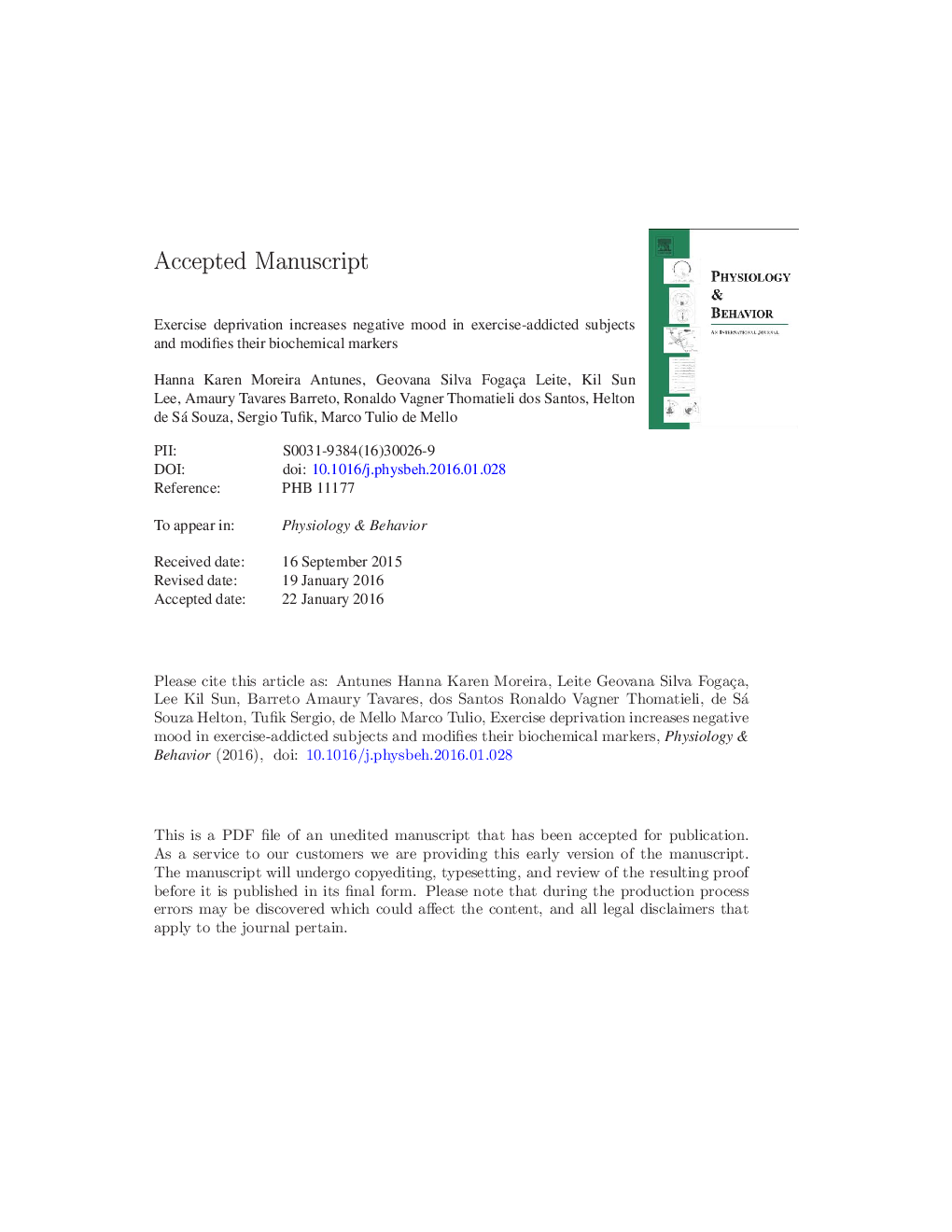| کد مقاله | کد نشریه | سال انتشار | مقاله انگلیسی | نسخه تمام متن |
|---|---|---|---|---|
| 5923010 | 1571162 | 2016 | 28 صفحه PDF | دانلود رایگان |
عنوان انگلیسی مقاله ISI
Exercise deprivation increases negative mood in exercise-addicted subjects and modifies their biochemical markers
ترجمه فارسی عنوان
محرومیت از ورزش، منع مصرف افراد معتاد را افزایش می دهد و نشانگرهای بیوشیمیایی آنها را تغییر می دهد
دانلود مقاله + سفارش ترجمه
دانلود مقاله ISI انگلیسی
رایگان برای ایرانیان
کلمات کلیدی
حالت، اعتیاد به ورزش، اناندامید، ورزش،
موضوعات مرتبط
علوم زیستی و بیوفناوری
بیوشیمی، ژنتیک و زیست شناسی مولکولی
فیزیولوژی
چکیده انگلیسی
The aim of this study was to identify the possible association between biochemical markers of exercise addiction and affective parameters in a sample of athletes during 2 weeks of withdrawal exercise. Eighteen male runners were distributed into a control group (n = 10) composed of runners without exercise addiction symptoms and an exercise addiction group (n = 8) composed of runners with exercise addiction symptoms. The volunteers performed a baseline evaluation that included affective questionnaires, blood samples, body composition and an aerobic test performed at ventilatory threshold I. After the baseline evaluation, the groups started an exercise withdrawal period that was sustained for 2 weeks. During exercise withdrawal, an actigraph accelerometer was used to monitor the movement index, and CK and LDH were measured in blood samples to validate the non-exercise practice. At the end of the exercise withdrawal period, a blood collection, aerobic test and mood scale was performed in the re-test. The results showed that at the end of the experimental protocol, when compared with the control group, the exercise addiction group showed an increase in depression, confusion, anger, fatigue and decreased vigor mood that improved post-exercise, along with low levels of anandamide at all time-points evaluated and a modest increase in β-endorphin post-exercise. Moreover, the exercise addiction group showed a decrease in oxygen consumption and respiratory exchange ratio after the exercise withdrawal period, which characterized a detraining phenomenon. Our data suggest that a 2-week withdrawal exercise period resulted in an increase of negative mood in exercise addiction; additionally, exercise addiction showed low levels of anandamide.
ناشر
Database: Elsevier - ScienceDirect (ساینس دایرکت)
Journal: Physiology & Behavior - Volume 156, 15 March 2016, Pages 182-190
Journal: Physiology & Behavior - Volume 156, 15 March 2016, Pages 182-190
نویسندگان
Hanna Karen Moreira Antunes, Geovana Silva Fogaça Leite, Kil Sun Lee, Amaury Tavares Barreto, Ronaldo Vagner Thomatieli dos Santos, Helton de Sá Souza, Sergio Tufik, Marco Tulio de Mello,
